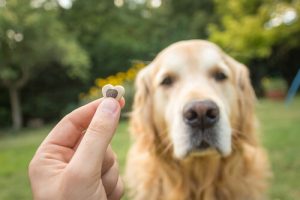Why You Should Never, Ever Hit Your Dog

“Violence only breeds violence.” These wise words can be applied in many different areas of life. That’s why you should turn a deaf ear to anyone who advises you to train your dog with physical punishment, often by hitting the dog. Good treatment, love and patience are the best tools for coexistence – and that includes coexistence with pets. So, here is more information about why you should never hit your dog.
Why you should never hit your dog
A dog that is subject to physical punishment will, as stands to reason, become evasive and fearful. And that’s not what we want from a pet, right? And a dog that feels intimidated by its owner can never properly take on board an order, or fully understand what the owner wants it to do.
And remember that dogs are extremely sensitive creatures, and are very able to perceive our emotions. Expressing your anger through physical violence or opting to hit your dog will only achieve the following:

- The dog will run away when you want to punish it.
- Alternatively, it will confront the situation and try to attack.
- Your dog will express its frustration and anxiety through a range of troubling behaviors: breaking objects, compulsively licking certain areas of the body, urinating in inappropriate places, etc.
If this happens, the solution is obviously not to increase the level of physical punishment, but to look for other ways to teach your dog how you want it to behave. If you do this, the problems should start to resolve themselves little by little. If they still persist, though, you should seek professional help – but make sure you consult an expert who is knowledgeable and responsible.
When you decide to take a dog into your life, one of your biggest responsibilities is to educate it. And you must do this with love, patience and respect – so hitting your dog is never an option.
Don’t hit your dog – educate it with love
The best way to educate a dog, without a doubt, is with love. Affection translates into patience, persistence and good treatment. If you employ a method known as positive reinforcement, you are sure to get better results than through abuse – which, don’t forget, is also punishable by law.
But what can you do to help your dog learn the basic rules of behavior? The basic idea behind the positive reinforcement approach is to reward good behavior and ignore the bad. It’s that simple – and when you do manage to get your furry friend to respond to an order, you should:
- Give him one of his favorite treats.
- Caress or stroke the dog.
- Express affection, telling the dog how well-behaved it is, and how proud you are of it.
Remember that your dog is a dog, and will always act as such
If you decide to share your life and your home with a pet, you should always try to keep in mind the following:
- Dogs don’t do things on purpose or in order to make you angry. Something that you, from your human perspective, consider to be ‘naughty’ behavior may in fact be totally normal to a dog. That’s why it’s so important to educate dogs with patience, to achieve a harmonious coexistence.
- There is no point in reprimanding a dog for something it has already done. Telling the dog off only works if you find it in flagrante. If not, the dog has no way of understanding why you are angry – so reprimanding the dog will only confuse it.
- If a dog continues to be badly behaved even though you are following a strict positive reinforcement regime, there is always a reason. It’s up to you to think about what this might be, and try to solve it. Punishing the dog – a projection of your own frustration – will only make matters worse.
Respect, patience and love when living with a pet

Never forget that, if you choose to have a pet, you must take responsibility for caring for it in every way. And making sure you treat your dog fairly and with respect is a top priority.
We started this article with a phrase about violence. Now, let’s use another to close it: “You reap what you sow.”
So, if you treat your pet with love, you will receive the same love back. On the other hand, if you subject your dog to physical violence, you will end up with a cowering or aggressive creature in your house. Is that really what you want? Surely not.
Remember that your four-legged friend is a complex living being and, as such, deserves to be treated with great respect. So treat your dog well and be patient with him or her. The dog will instinctively know how to repay you – you should be in no doubt of that.
This text is provided for informational purposes only and does not replace consultation with a professional. If in doubt, consult your specialist.